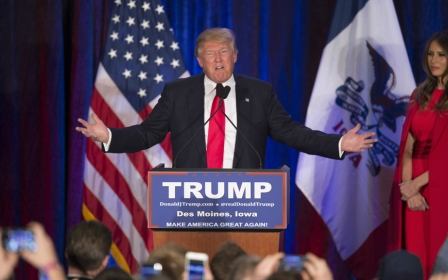Arab Americans a 'swing constituency' in US presidential election

NEW YORK, United States – No analysis of US balloting trends is complete without mentioning the country’s large ethnic voting blocs. Mindful presidential hopefuls know that black and Latino voters can swing states – and that swing states can win the White House.
The smaller population of Arab Americans is often neglected in these counts. But the surprise win of Vermont Senator Bernie Sanders in last week’s Democratic primary election in Michigan – partly through his popularity among Arab Americans – is changing perceptions.
According to Maya Berry, executive director at the Arab American Institute (AAI), a lobby group, Arab-American voters are a key bloc in Michigan, Ohio, Pennsylvania, Florida and other states expected to be battlegrounds in the November presidential poll.
“We may be 3.7 million Arab Americans in this country, but because of where we are concentrated, and because of our voting patterns, we actually are a perfect swing constituency,” Berry told Middle East Eye.
“We’re in about 12 key states, and within those 12 states, there’s a significant portion that play very important electoral roles.”
Sanders, a left-wing Jewish septuagenarian, scored well in the Arab-American parts of Dearborn, Michigan, in last week’s primary, where he got 67 percent of the vote, compared to Hillary Clinton’s 32 percent, helping him secure the state.
Michigan is home to America’s densest population of ethnic Arabs (five percent, said Berry), but they are also present in mostly urban parts of California, New York, Florida, Texas, New Jersey, Illinois, Ohio, Pennsylvania and Virginia.
According to Berry, Arab-American voters could be key in Tuesday’s primary votes in Florida and Ohio, where Sanders is seeking to gain ground against Clinton and, on the Republican side, construction tycoon Donald Trump seeks to cement his position as the frontrunner.
In close-call races, even such small constituencies as Arab Americans “can sway the outcome”, said Berry.
Arab Americans are not yet counted in the US census, so the population figure of 3.7 million may be an inflated estimate that equates to about 1.1 per cent of the population. Latinos (17.4 per cent) and blacks (13.2 per cent) are bigger chunks of the melting-pot nation.
Conservative, educated and ready to vote
Contrary to popular opinion, Arab Americans are mostly Christian, not Muslim, said Berry. They are typically well-educated and vote in greater numbers than the average American in both primary and presidential ballots.
With traditions of social and economic conservatism, they were evenly split between the main parties until the turn of the century, and backed George W Bush by 44.5 per cent in the 2000 presidential election, according to pollster John Zogby.
Since the 9/11 attacks on New York and Washington, Arab Americans have edged left and currently favour the Democrats (about 40 percent) over the Republicans (20 percent), while 30 percent remain independent, according to AAI.
“There were issues related to the Iraq War, to Abu Ghraib in particular, and the Palestinian issue that tilted Arab Americans away from the Republicans and towards the Democrats, most particularly the 25 or 30 percent (of US Arabs who) are Muslim Americans,” Zogby told MEE.
Arab Americans are typically small business owners and professionals who are swayed by the same bread-and-butter issues as other Americans – jobs, taxes, schools and hospitals. US foreign policy is important, but not paramount, according to AAI studies.
They are being driven even further into the Democratic fold this election cycle, analysts say.
Trump has famously slammed Muslims, Syrian refugees and an unverified number of New Jersey residents who celebrated the 9/11 attacks, but other Republican candidates have been accused of comparable anti-Arab undertones in campaign rhetoric.
Ted Cruz, a Texas senator, says he would “carpet bomb” Islamic State (IS) territory. Both he and Marco Rubio, a Florida senator, have offered unflinching support to Israel in its fight against Palestinians and other Arabs.
“The Republicans are just too damn dangerous because they’re acting so evangelical about Israel,” Zead Ramadan, 49, a politically active Palestinian-American coffee shop owner in upper Manhattan, told MEE.
“We cannot naturally support a Republican just because their rhetoric has become so anti-Arab, anti-Muslim, anti-immigrant, anti-anything-that-exists. You know, anything that we are.”
Resisting xenophobia
Sarab al-Jijakli, president of the Network of Arab American Professionals, said Arab and Muslim community leaders are campaigning via the social media hashtag #aboutuswithoutus to regain a voice in a xenophobic election cycle.
“The negative rhetoric has seen acceptable bigotry and Islamophobia come full force, especially on the Republican side, with refugees being utilised as a political nugget to instil fear into the US population, in a crazy election cycle that has become about us, without us,” Jijakli told MEE.
For Berry, the real worry is not the politicians but their fan bases.
“There’s a very real problem among Republican, male, evangelical Christian voters having very negative views of Arabs and Muslims. Part of Trump’s success is his ability to tap into that; the idea that it’s working is very disconcerting,” Berry told MEE.
This leaves a tough choice between the two surviving Democratic candidates, said Ramadan.
“We’re split on Bernie Sanders and Hillary,” Ramadan said.
Clinton is seen as unsupportive of Palestinians and too friendly with Israel’s hard-line leadership, but Arab-American voters may coalesce behind her over Sanders as she becomes the most likely Democratic nominee, Ramadan added.
Stay informed with MEE's newsletters
Sign up to get the latest alerts, insights and analysis, starting with Turkey Unpacked
Middle East Eye delivers independent and unrivalled coverage and analysis of the Middle East, North Africa and beyond. To learn more about republishing this content and the associated fees, please fill out this form. More about MEE can be found here.




